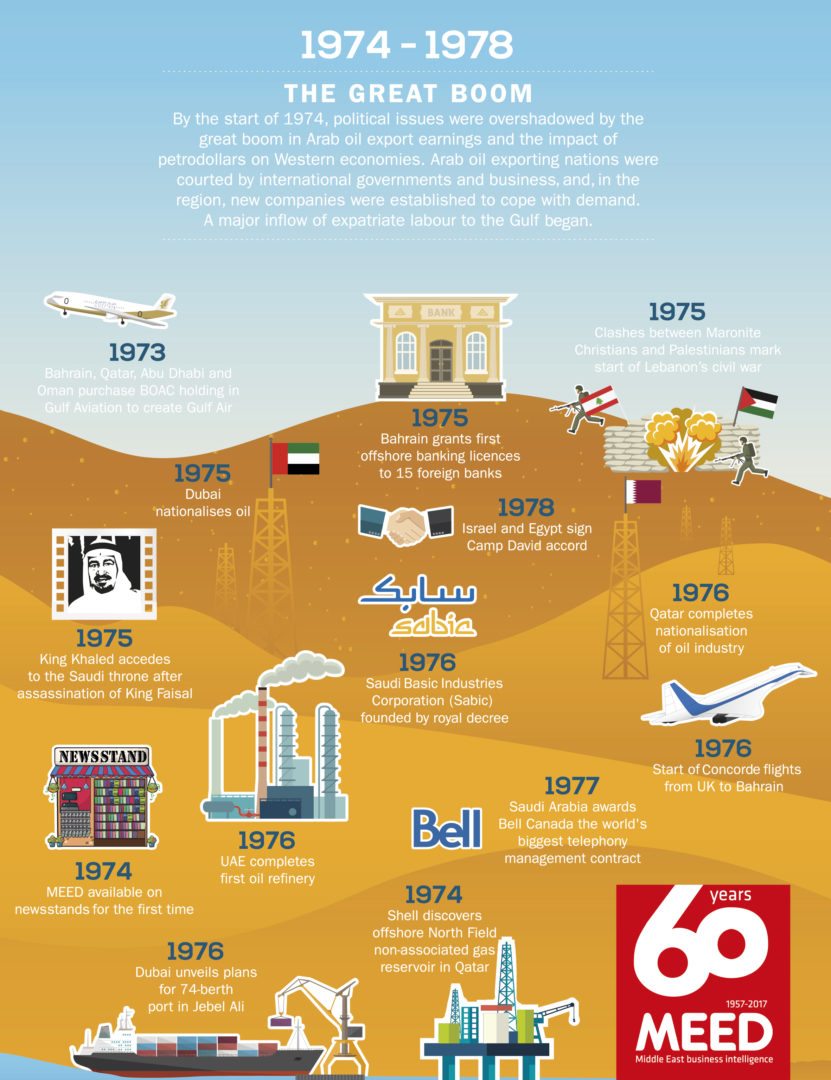

By the start of 1974, political issues were overshadowed by the great boom in Arab oil export earnings and the impact of petrodollars on Western economies. Arab oil-exporting nations were courted by international governments and business, and in the region new companies were established to cope with demand. A major inflow of expatriate labour to the Gulf began

MEED 1974-1978 infographic
MEED 1974-1978 infographic
Following the quadrupling of oil prices agreed by Opec at the end of 1973 in the wake of the Arab oil embargo, interest in the Middle East shifted to the economic opportunities emerging in the Gulf. Political issues were outweighed by the great boom in Arab oil export earnings and concerns about the impact of petrodollar surpluses on Western economies.
Arab oil exporting nations were courted around the world as governments and companies competed for some of the most valuable contracts in history. Within the Middle East, new banks and companies were established to cope with demand for financial and construction services. And a major inflow of expatriate labour to the Gulf began.
31 March 1961
Kuwaiti dinar introduced to replace the Indian rupee
25 March 1966
Amman announces plans to form a new national oil company with rights to the whole country
26 March 1988
Iran presents evidence of Iraqi chemical weapons attack on Halabja, in which at least 5,000 civilians were killed
18 March 1983
Saudi Arabias role as Opec swing producer formalised
16 March 1990
GCC officials meet in Bahrain to discuss an estimated $1.6bn project to link the electricity grids of the Gulf
19 March 1999
Sheikh Hamad bin Isa al-Khalifa sworn in as ruler of Bahrain
At MEED, the only weekly magazine devoted to reporting on economic developments in the region, a major expansion of editorial and commercial activities was initiated to cope with the demand for information about the Middle East.
Inspired by Opecs success, Gulf states started to nationalise their oil industries. Huge infrastructure projects, including the twin industrial cities of Jubail and Yanbu in Saudi Arabia, were launched. In a drive to diversify sources of income away from oil, refineries and new industries, including Dubai Aluminium Company (Dubal) and the first Saudi heavy industrial schemes, were given life.
Then, in 1977, Egypts President Anwar Sadat announced a visit to Israel in a unilateral break of the Arab embargo on the Jewish state. For a brief period, Middle East peace seemed within reach, but these hopes were quickly dashed as every other Arab country not only refused to follow Cairos lead but imposed sanctions on Egypt.
Meanwhile, on the north side of the Gulf in 1978, it became evident the shah of Iran was in serious trouble. Massive street demonstrations culminated in the shahs departure into permanent exile, the end of the Pahlavi dynastys rule and the arrival in Tehran of Ayatollah Khomeini. On 11 February 1979, control of the state passed formally to the revolutionary movement.
Few paid attention to developments in Baghdad, still furious after being forced to share sovereignty over the Shatt al-Arab with Iran in the 1975 Algiers agreement. In 1979, Saddam Hussein became president of Iraq.
You might also like...

Iraq signs deal to develop the Akkas gas field
25 April 2024

Emaar appoints beachfront project contractor
25 April 2024

Acwa Power signs $356m Barka extension
25 April 2024

AD Ports secures Angola port concession agreement
25 April 2024
A MEED Subscription...
Subscribe or upgrade your current MEED.com package to support your strategic planning with the MENA region’s best source of business information. Proceed to our online shop below to find out more about the features in each package.








